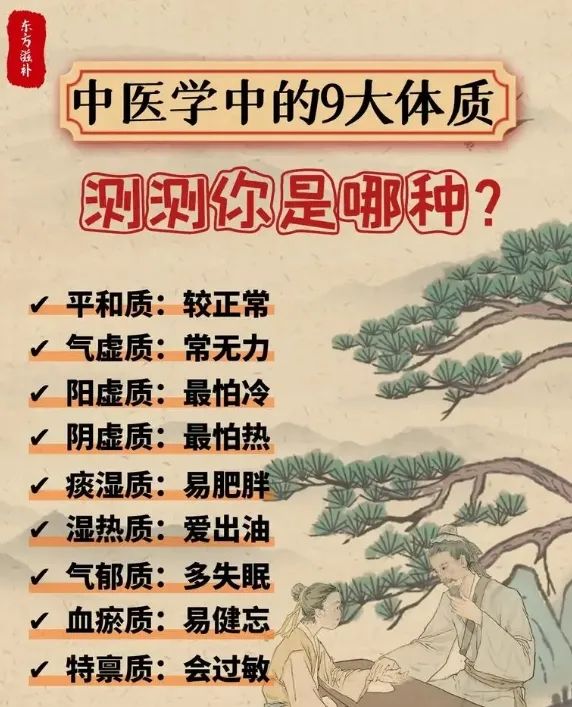Why are children prone to illness?
Why do children exhibit different symptoms when they are sick?
Why do all the tests and examinations of children appear normal,
yet they have poor constitution, pale complexion, lack of energy, and are easily susceptible to colds?
What types of children are prone to illness? Why do some children adapt well to new foods without any discomfort, while others experience digestive issues leading to diarrhea or constipation?
The various confusions and worries that parents encounter during their children’s growth
are fundamentally rooted in the different constitutional types of children.

Traditional Chinese Medicine (TCM) believes that the individual differences in children’s constitution are one of the important reasons for these situations. Children with different constitutions exhibit different characteristics and thus require different nurturing principles.
Constitution is not solely innate; it is the result of both innate and acquired factors. Understanding what constitution you or your child has can provide a clearer insight into their health status and help them grow up healthier.
If you want your child to be less prone to illness and full of vitality, you need to identify their constitutional type and provide targeted nurturing.

What types of constitutions do children have?
Harmonious Constitution (Ping He Zhi)
Characteristics: Calm and cheerful personality, good nutrition, well-proportioned body, tolerant of cold and heat, good sleep, normal bowel and bladder function.
Tendency to Illness: Generally less prone to illness, easy recovery after sickness. This is the healthy constitution that all parents desire for their children and is also the goal of TCM pediatric care.
Qi Deficiency Constitution (Qi Xu Zhi)
1. Lung Qi Deficiency: Children with lung Qi deficiency often have open pores, making them susceptible to cold, heat, and dampness, leading to frequent colds, coughs, and fevers. Some children sweat excessively, showing symptoms of spontaneous sweating or night sweats, and sweat easily with any movement.
2. Spleen Qi Deficiency: The spleen governs transformation and transportation; when its function is weakened, it can lead to constipation or diarrhea, and children may have poor appetites.
3. Kidney Qi Deficiency: This manifests as bedwetting, delayed growth and development, and delays in walking, standing, and speaking.
Characteristics: Lethargic spirit, easy fatigue, quiet and inactive, pale complexion, light-colored lips, dull hair, prone to abdominal distension, irregular bowel movements; often introverted and timid; poor tolerance to external cold and heat.
Yin Deficiency Constitution (Yin Xu Zhi)
Characteristics: Impatient and irritable personality, slender physique, fear of heat, preference for cold drinks, thirst, hot palms and soles, flushed complexion, vivid dreams, dry stools, and yellow urine.
Causes: 1. Frequent late nights; 2. High intake of greasy and spicy foods can injure the body’s fluids, leading to insufficient body fluids.
Yang Deficiency Constitution (Yang Xu Zhi)
Characteristics: Fear of cold, cold hands and feet, pale complexion, prone to loose stools after eating raw or cold foods, clear and frequent urination, and increased nighttime urination.
Causes: 1. Related to diet; consumption of cold foods harms Yang; cold drinks, ice cream, etc.; 2. Excessive intravenous fluids; antibiotics are often bitter and cold, harming Yang Qi; 3. Incorrect nurturing methods.
Phlegm-Damp Constitution (Tan Shi Zhi)
Characteristics: Overweight, lack of exercise, preference for greasy foods, drowsiness, normal or slightly loose stools, and low urine output. Children with phlegm-damp constitution are prone to cough and wheezing, which can also lead to constipation and diarrhea, affecting sleep quality, mouth breathing during sleep, adenoid hypertrophy, leading to adenoid facies, and affecting growth hormone secretion, resulting in suboptimal height.
Causes: Dietarily, children tend to eat foods that easily produce phlegm; phlegm-damp children generally love meat, and also enjoy snacks like fried chicken, hamburgers, and drinks like milk tea and fruit juice that can generate heat.
Damp-Heat Constitution (Shi Re Zhi)
Characteristics: Preference for coolness, fear of heat, oily facial skin, prone to acne, excessive thirst, bad breath, excessive eye discharge, yellow urine, and dry or sticky stools. If phlegm-damp is not addressed in time, it can quickly develop into damp-heat constitution, with children exhibiting yellow and greasy tongue coating, phlegm-damp accumulation generating heat, rising to the head and face, leading to recurrent oral ulcers and halitosis. Accumulation in the middle burner (spleen and stomach) can also cause poor appetite and aversion to food. Additionally, children with this constitution are prone to eczema, rhinitis, tonsillitis, and urinary tract infections.
Causes: 1. Long-term consumption of rich and greasy foods, or excessive intake of high-sugar, high-fat, high-salt, and spicy foods; 2. Weak spleen and stomach function, which may lead to abnormal water metabolism, resulting in internal damp-heat accumulation; 3. Long-term late nights, irregular schedules, and excessive fatigue can lead to the accumulation of damp-heat substances.
Qi Stagnation Constitution (Qi Yu Zhi)
Characteristics: Prone to anxiety and restlessness, low mood, easily frightened or startled, and sighing without reason. More susceptible to conditions like tics, depression, and anxiety.
Causes: Introverted and sensitive personality, or encountering setbacks and stress; overly strict or suppressive parenting may restrict the natural expression of emotions, leading to Qi stagnation over time; children’s endocrine and nervous systems may be underdeveloped, making them more susceptible to Qi stagnation symptoms.
The focus of constitution is on nurturing

All constitutions are changeable; through proper nurturing and intervention, they can transform into one another. Timely intervention and reasonable nurturing can lead to a balanced constitution, while neglecting them may lead to deterioration. Through correct feeding, activity, and lifestyle adjustments, we can regulate children’s metabolic processes, enhance their resistance, and effectively prevent childhood diseases.

